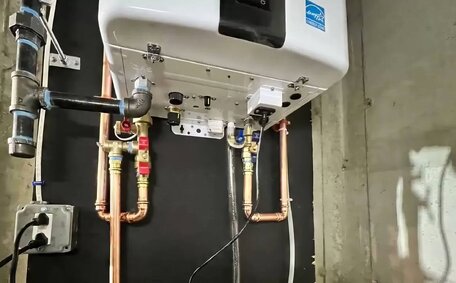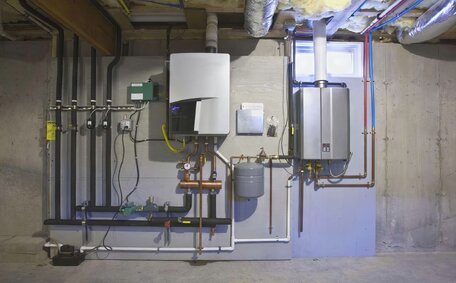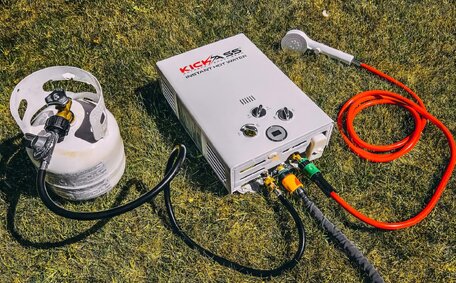Introduction to Unpleasant Smells in Hot Water Systems
Unpleasant smells from hot water systems demand immediate intervention. Strange and bothersome odours, including any burning smell when your water smells like rotten eggs can indicate underlying issues that require prompt troubleshooting. Left unchecked, foul smells can intensify and lead to bigger problems.
Understanding the causes of these odours is essential for effective troubleshooting of your water heater. Bacterial growth and corrosion are often the culprits behind bad smells in hot water heaters and pipes. Identifying and rectifying these issues is key to restoring clean, odour-free hot water in your home.
As leading Croydon Park plumbing services with deep expertise in hot water systems, we are well-equipped to diagnose why your hot water smells like it does and provide effective solutions for it. Reach out to local plumbing experts for resolution of water-related problems.
Common Causes of Odors in Hot Water
Multiple factors contribute to the emergence of foul odours in hot water systems:
Bacterial Growth
Sulphate-reducing bacteria (SRB) are often to blame for hot water smelling foul. These bacteria, feeding on sediments and metals within water heaters, produce hydrogen sulfide gas as a byproduct of sulfur bacteria activity, which can cause the notorious “rotten egg” smell.
Improper temperature control can lead to rapid bacterial multiplication. Your tank should be maintained at high levels, ideally at least 60°C, to ensure the water can in your system is less hospitable to bacterial growth.
Chemical Reactions
Chemical interactions between metallic components and water minerals can also produce unpleasant smells. The sacrificial anode rod is particularly susceptible, corroding over time and potentially affecting water quality.
Replacing a degraded anode rod can reduce odours, while also tackling corrosion-induced scale that harbours bacteria.
Contaminated Source Water
If the smell persists even after servicing the system, the cause may be connected to your public water source, which may also need attention. Organic matter decay in contaminated city water supplies can lead to hydrogen sulphide gas, affecting drinking water quality and safety.
Reach out to water treatment experts for help with identifying and mitigating water source issues. Point-of-entry water treatment or disinfection may be required to remove contamination.
While regular maintenance ensures water quality and taste, should these be compromised, it’s advisable to contact Croydon Park Plumbing. Our certified technicians are on hand to swiftly manage your hot water and climate control needs with effective solutions.
Sulfate-Reducing Bacteria
Sulphate-reducing bacteria (SRB) are anaerobic microorganisms that commonly live inside water heaters. SRBs metabolise sulphate ions in water, resulting in the production of hydrogen sulphide gas, which emits a distinct “rotten egg” odour.
SRB thrive in low-oxygen environments like water tanks, particularly where corrosion and sediment build-up are high. The bacteria feed on minerals, metals and organic contaminants, accelerating corrosion. This corrosion process damages components like the anode rod.
Controlling SRB growth necessitates rigorous hot water heater maintenance, including periodic tank flushing to eliminate sediment. Replacing corroded anode rods also limits SRB by removing their food source.
Keeping temperatures above 60°C is crucial for preventing taste and smell alterations from bacterial overgrowth.
Persistent “rotten egg” odours, despite servicing, warrant a comprehensive SRB treatment protocol. Contact Croydon Park Plumbing to learn about effective bacterial eradication options.
Anode Rod Corrosion Reactions
The anode rod is a crucial component inside a water heater tank. Constructed from reactive metals like aluminium and magnesium, the rod attracts corrosive elements away from the tank itself. This sacrificial protection unfortunately causes the anode to deteriorate, making it necessary to get rid of the old rod eventually.
As the magnesium anode rod corrodes, it interacts with sulphate-reducing bacteria and releases hydrogen sulphide gas. This malodorous rotten egg smell signals that corrosion levels are intensifying. If left unchecked, escalating corrosion also produces sediment that enables further bacterial growth.
To inhibit corrosion and odour issues, anode rods require replacement every 2-5 years. Replacing a heavily corroded anode rod removes the elements that generate the offensive hydrogen sulphide odour.
Allowing corrosion to advance puts your water heater at risk. Contact Croydon Park Plumbing to learn about anode rod maintenance or replacement to safeguard your hot water system.
Sediment Buildup in Water Heaters
Sediment can accumulate at the base of water heaters over time. This sediment provides the ideal breeding ground for bacteria, which are often responsible for the foul odor in your water system. Sediment and bacteria growing then interact, accelerating corrosion in your water heater tank and hydrogen sulphide gas production.
To inhibit sediment formation inside the tank, regular flushing of the water heater is imperative. Draining a few litres clears out solid deposits before they worsen. Flushing also eliminates any potential bacterial growth that can happen within the sediment.
An annual flushing regimen helps address sediment build-up and prevent unpleasant odours. Contact Croydon Park Plumbing if you need assistance accessing the drain valve for proper flushing and sediment removal from your hot water system.
Routine Maintenance to Prevent Odors
Performing routine maintenance on your hot water system, including checking gas your lines, is crucial for preventing unpleasant odours. This includes:
Temperature Control
Set your hot water heater to no less than 60°C. This inhibits bacterial growth like sulphate-reducing bacteria (SRB) which necessitates knowing how remove hydrogen sulphide gas and rotten egg smells effectively.
Regular Flushing
Annually flush out sediment from your heater by draining and running hot water through it. and whatever might be coming your water supply’s way where odour-causing bacteria can thrive. Follow these steps:
- Turn off your gas supply to the water heater
- Connect a garden hose to the drain valve near the bottom of the tank
- Open the pressure relief valve on top
- Open the drain valve and let the water comes out for a few minutes to flush away loose sediment
- Close all valves, refill the tank, and restore power
Inspecting Parts
Check components like your anode rod during flushing. If significantly corroded, replace your anode rod to avoid it interacting with sulphates and producing hydrogen sulphide gas.
By incorporating regular maintenance into your routine, you ensure your water clean and can keep unpleasant odours at bay. Contact Croydon Park Plumbing if you need assistance maintaining your hot water system.
Determining if the Source is the Water System or Water Heater
Determining whether unpleasant smells stem from the hot water system or the overall water supply aids in accurate troubleshooting.
Determine whether odours are specific to the hot tap or also present in the cold tap. Run both hot and your cold water taps, collecting glasses of each to compare the smell then. If you detect that your tap water smells like contaminants as well, it could be indicative of an issue with home plumbing or source contamination such as from well water supplies.
A stagnant smell from the hot water heater likely indicates the heater is at fault. Drain a glass to test – smells from motionless storage likely derive from sediment or anode rod corrosion enabling bacterial growth inside the tank.
Contact Croydon Park Plumbing if you’re asking 'What do I do?' and need assistance determining whether smell coming your smelly water stems from the heater or pipes. Our qualified technicians can diagnose the root cause and recommend solutions to maintain the water quality in your house.
Troubleshooting Tips for Eliminating Unpleasant Smells
If your hot water is smelly, consider these troubleshooting tips before seeking professional help:
Flush The Tank
Fully drain the smelly tank to remove any sediment and eliminate odours. Follow the steps for proper flushing mentioned in the "Routine Maintenance" section.
Check The Anode Rod
Remove and examine the anode rod. If significantly corroded, replace it to avoid ongoing hydrogen sulphide gas production.
Shock Chlorination
Eliminate bacteria inside the tank by pouring half a gallon of bleach suitable for whole house disinfection into the drained tank, filling it with water, and letting it sit for 15 minutes before thoroughly flushing.
Increase Temperature
Ensure your hot water system is set to at least 60°C to inhibit bacterial growth.
When to Replace the Anode Rod
There are a few key signs indicating it’s time to replace your water heater’s anode rod:
Unpleasant Odours
If you notice the "rotten egg smell your" hot water emits despite tank flushing and other maintenance, the anode rod is likely corroded and interacting with sulphates to produce hydrogen sulphide gas. Replacing it stops this process.
Visually Examining the Rod
Pull the anode rod out and check its condition yearly. Significant pitting, corrosion, flakes or chunks missing means replacement is needed to halt deterioration.
Age and Lifespan
Anode rods should be considered for replacement typically every 2-5 years, though the degree of corrosion is the main factor. It’s advisable not to exceed a five-year interval before assessing the anode rod’s condition.
Allowing severe anode corrosion risks tank failure. Contact Croydon Park Plumbing to learn about cost-effective anode rod replacement to protect your water heater’s longevity.
Seeking Professional Inspection and Repair
While there are some troubleshooting steps you can try yourself, Persistent unpleasant odours from your hot water system typically require professional intervention. If flushing the tank, increasing temperatures, or anode rod replacement do not resolve the issue, it could be indicative of a problem your heater causing that requires a licenced plumber’s inspection and repair.
Croydon Park Plumbing, as hot water specialists, possess extensive expertise in diagnosing and resolving causes of bad water odours. We can:
- Thoroughly inspect your entire system
- Identify contamination from incoming water lines
- Test and adjust equipment like valves and anode rods
- Flush heaters and implement shock chlorination if bacteria is detected
- Check and replace corroded parts as needed
- Restore clean, odour-free hot water
Don’t let unpleasant and potentially hazardous hydrogen sulphide gases persist. Contact Croydon Park Plumbing today to schedule comprehensive water heater and your kitchen heater repair services. Locals in Croydon Park and surrounding suburbs can call 1300 349 338 or email jobs@croydonparkplumbingservices.com.au to resolve their hot water smell issues.
Homeowner Tips for Odor Prevention
Odour prevention in your hot water system requires establishing essential household routines.
Set your water heater to at least 60°C to discourage bacterial proliferation.
Consider installing a water softener system for soft water if you have hard water with high mineral content or contamination.
For odour control, perform shock chlorination biannually by adding half a gallon of bleach into the tank, followed by flushing with a hydrogen peroxide solution after 15 minutes. This eliminates any existing bacteria.
Stay vigilant with these preventive maintenance steps, and contact Croydon Park Plumbing immediately if foul odours occur so we can fully diagnose and treat the root cause.






